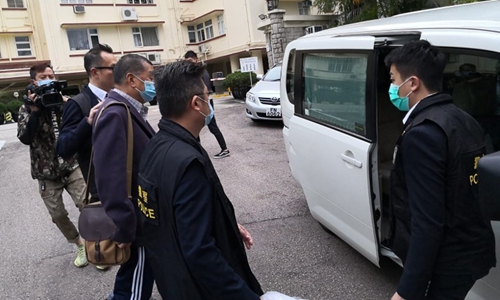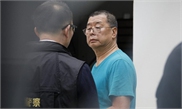Jimmy Lai is a force of evil, not a ‘hero’ for democracy

Photo: on.cc
Hysteria from some in the West predictably hit after Hong Kong police on Friday arrested Apple Daily founder Jimmy Lai Chee-ying and two other anti-government figures, who last year instigated one of the most violent and chaotic riots in the city.
Apart from their manufactured outrage, these Western politicians, media outlets and activists paint Lai as a “hero” for democracy who has been “suppressed.” But for fair-minded people familiar with the 72-year-old’s words and deeds - and the grave consequences of his actions for the roughly 7 million residents in the city - he is a traitor, a criminal and a force of evil who has sowed violence and chaos in arguably one of the freest and most prosperous cities in the world.
First, let’s take a look at why he and his two peers were arrested. According to the Hong Kong Police Force, the trio was arrested for “criminal intimidation” in June 2017 and again for illegal assembly in August 2019.
The intimidation case involved an incident during a protest, during which Lai approached a reporter for the Oriental Daily newspaper, pointed his finger and issued a profanity-laden threat. “I will definitely deal with you. I am telling you now that I have already taken a picture of you! [Expletive] your mother!” Lai said to the reporter.
Does that sound like something a “hero” for democracy would say or do? Set aside the startling profanity. This is someone who has been described as a voice of the free press and free speech, trying to shut down a reporter who was just doing his job and exercising his rights as a journalist. Doesn’t that reporter have freedom-of-press rights? Is Lai’s own Apple Daily entitled to those rights? Needless to say he broke the law by threatening an individual. That is illegal in Hong Kong, as it is almost anywhere in the world. It is beyond our imagination how someone like that could be hailed as a hero for democracy.
Fast forward to August 31, 2019. It was arguably one of Hong Kong’s darkest days when black-clad anti-government protests began during an illegal gathering. Fires were set in the streets and Molotov cocktails were hurled at police officers. Often referred to as “831,” it was one of the most violent and chaotic days during the period of unrest last summer.
And, yes, being the “hero” he is said to be, Lai was there. More precisely, Lai was a protest “leader,” but he did not offer the kind of leadership that preaches calm and peace. He was a central figure along with the other two arrested, who collectively instigated the violence that ensued. Lai reportedly left the scene in a hurry after he had finished inciting the protestors, presumably to avoid the consequences of his actions. And as it turns out, he was successful until Friday.
The rally that day was determined to have been illegal. Just as in countries like the US and the UK, a permit – or a letter of no objection as it’s known in the city – is required to hold an assembly in Hong Kong. It should be common sense that freedom of assembly does not mean lawlessness. And those who participate in illegal activities should be punished by law. Why should Lai be treated differently to others who were arrested for taking part in the event? Because he is rich? Because he has powerful friends in the West? If he is not punished, what does that say about Hong Kong’s rule of law, a crucial part of any democratic system that Lai and his foreign friends claim to defend?
Lai’s sins go beyond his troubles with the law. He has been arrested before; he has frequently colluded with US officials in high-profile meetings; and he has openly solicited interference in China’s internal affairs related to Hong Kong. Are these not the actions of a traitor? To put it into terms many in the West can understand: US President Donald Trump was investigated for nearly two years due to his suspected collusion with Russia, and several senior US officials and other individuals have since been charged or convicted. Some were involved in private meetings with Russian officials or other individuals. Lai does not hide his meetings - quite the opposite, he advertises them.
If the irony is still not apparent to some, then it is fair to say that they cannot be convinced. The most important thing is that when Lai is put behind bars, and as his friends in the West continue their hysteria, people across China - including those in Hong Kong - will be cheering and relieved that long-overdue justice is finally served.

